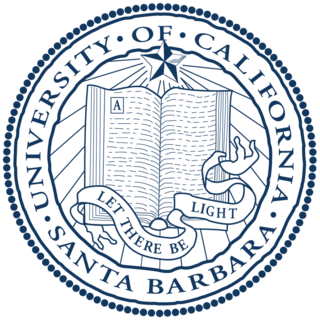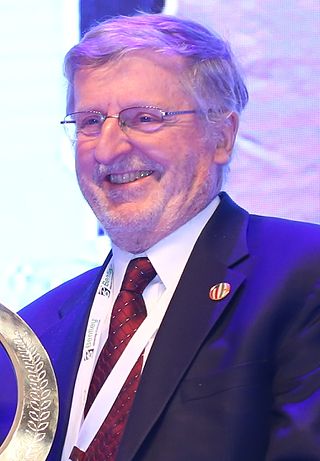
The University of California,Santa Barbara,is a public land-grant research university in Santa Barbara,California,United States. It is part of the University of California university system. Tracing its roots back to 1891 as an independent teachers' college,UCSB joined the ancestor of the California State University system in the 1920s and then moved over to the University of California system in 1944. It is the third-oldest undergraduate campus in the system,after UC Berkeley and UCLA. Total student enrollment for 2022 was 23,460 undergraduate and 2,961 graduate students.

Michael Frank Goodchild is a British-American geographer. He is an Emeritus Professor of Geography at the University of California,Santa Barbara. After nineteen years at the University of Western Ontario,including three years as chair,he moved to Santa Barbara in 1988,as part of the establishment of the National Center for Geographic Information and Analysis,which he directed for over 20 years. In 2008,he founded the UCSB Center for Spatial Studies.
Craig Jon Hawker is an Australian-born chemist. His research has focused on the interface between organic and polymer chemistry,with emphasis on the design,synthesis,and application of well-defined macromolecular structures in biotechnology,microelectronics,and surface science. Hawker holds more than 45 U.S. patents,and he has co-authored over 300 papers in the areas of nanotechnology,materials science,and chemistry. He was listed as one of the top 100 most cited chemists worldwide over the decade 1992–2002,and again in 2000–2010.

The President's Council of Advisors on Science and Technology (PCAST) is a council,chartered in each administration with a broad mandate to advise the president of the United States on science and technology. The current PCAST was established by Executive Order 13226 on September 30,2001,by George W. Bush,was re-chartered by Barack Obama's April 21,2010,Executive Order 13539,by Donald Trump's October 22,2019,Executive Order 13895,and by Joe Biden's February 1,2021,Executive Order 14007.
William H. Schlesinger is a biogeochemist and the retired president of the Cary Institute of Ecosystem Studies,an independent not-for-profit environmental research organization in Millbrook,New York. He assumed that position after 27 years on the faculty of Duke University,where he served as the Dean of the Nicholas School of the Environment and Earth Sciences and James B. Duke Professor of Biogeochemistry.
Michael Stohl is Professor and a former Chair of the Department of Communication at the University of California,Santa Barbara. He researches organizational and political communication with special focus on terrorism,human rights and global relations. He has been a guest commentator on National Public Radio,NBC,and CBS for stories on terrorism and human rights. He has been critical of the George W. Bush administration's understanding of terrorism networks during the War on Terrorism.

James J. McCarthy was a Professor of Biological Oceanography at Harvard and was president of the American Association for the Advancement of Science from February 2008 to February 2009.

Alan L. McPherson is a historian specializing in US-Latin American relations. He is the Thomas J. Freaney,Jr.,Professor of History at Temple University,where he is also the Director of the Center for the Study of Force and Diplomacy (CENFAD).

The contributions of women in climate change have received increasing attention in the early 21st century. Feedback from women and the issues faced by women have been described as "imperative" by the United Nations and "critical" by the Population Reference Bureau. A report by the World Health Organization concluded that incorporating gender-based analysis would "provide more effective climate change mitigation and adaptation."
Alice Alldredge is an American oceanographer and marine biologist who studies marine snow,carbon cycling,microbes and plankton in the ecology of the ocean. She has conducted research in the open sea,at her laboratory at the University of California,Santa Barbara as well as in collaboration with the Long Term Ecological Research Network (LTER) at the Mo'orea Coral Reef Long Term Ecological Research Site in Mo'orea,French Polynesia. According to the annual ISI Web of Knowledge list published by Thomson Reuters,she has been one of the most cited scientific researchers since 2003.
Jean Beagle Ristaino is an American scientist and William Neal Reynolds Distinguished Professor of Plant Pathology. She is best known for her work on the epidemiology and population genetics of Oomycete plant pathogens in the genus Phytophthora and her work on the population genomics of historic outbreaks of the Irish famine pathogen,Phytophthora infestans

Christopher G. Boone is the dean of the ASU School of Sustainability. President Michael M. Crow appointed him as dean in 2013. Previously he served as associate dean (2010–2013) and was the graduate director when the school was established in 2006. He sits on a two-member directorate for the Julie Ann Wrigley Global Institute of Sustainability,which leads and supports sustainability research,education,and outreach efforts across all 17 colleges at Arizona State University. For the recently established ASU Global Futures Laboratory,he serves on the executive committee.
Vale Leonard Broom also known as Leonard Bloom,was an American sociologist whose career spanned seven decades. He was known for his research on discrimination and social inequality,which began with his studies on the effects of Japanese internment.
Noelle Eckley Selin is an atmospheric chemist and Associate Professor at Massachusetts Institute of Technology in the Institute for Data,Systems and Society and the Department of Earth,Atmospheric and Planetary Sciences.
Edward Telles is Distinguished Professor of Sociology at the University of California,Irvine and Director of the Center for Research on International Migration. He has authored several books and many articles,winning numerous prizes including the Distinguished Scholarly Publication Award from the American Sociological Association. He has been a leader in the study of race,color and ethnicity globally and throughout the Americas as well as on immigration and immigrant integration in the United States.
Mark S. Cladis is an author and the Brooke Russell Astor Professor of the Humanities at Brown University. Since arriving at Brown in 2004,he served as Chair for several 3-year terms. His teaching and scholarship are located at the various intersections of religious studies,philosophy,and environmental humanities. He has published five books. His current book project is Radical Romanticism,Democracy,and the Environmental Imagination. He has also published over sixty articles,essays,and chapters in edited books.
Deborah J. Donnell is a New Zealand and American biostatistician known for her research on the prevention of HIV infection. She is a professor in the Vaccine and Infectious Disease Division and Public Health Sciences Division of the Fred Hutchinson Cancer Research Center,and an affiliate professor of global health and health services at the University of Washington.
Barbara Jo Turpin is an American chemist who is a Professor of Atmospheric Chemistry at the University of North Carolina at Chapel Hill. Her research considers aerosol science and environmental engineering. Turpin studies the formation of organic particulate matter via aqueous chemistry. She was awarded the 2018 American Chemical Society Award for Creative Advances in Environmental Science and Technology. Turpin is a Fellow of the American Association for Aerosol Research,American Geophysical Union and American Association for the Advancement of Science.
Christopher Golden is an ecologist,professor and epidemiologist researching the human health impacts of environmental change,specifically in the context of global trends in biodiversity loss and ecosystem transformation.
Richard P. Appelbaum is an American sociologist. He is Distinguished Professor Emeritus and former MacArthur Foundation Chair in Global and International Studies and Sociology at the University of California,Santa Barbara,and currently a professor at Fielding Graduate University.







